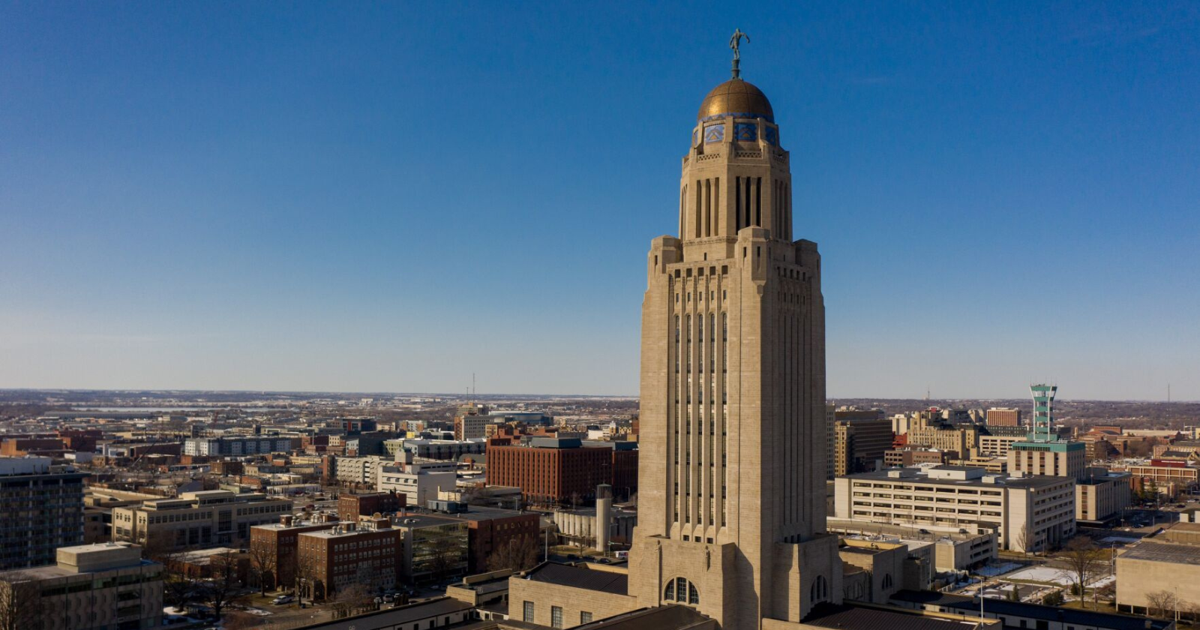A key state lawmaker intends to forge ahead with Gov. Jim Pillen’s plan for cutting property taxes by raising sales taxes and capping local government spending, despite opposition to most pieces of the proposal.
Linehan
State Sen. Lou Ann Linehan of the Omaha area, the chairwoman of the Revenue Committee, said she was not swayed by the hours of testimony against the bills that could become part of an overall package.
“We had nobody come in with better answers,” she said. “Sure, everybody’s going to come in and say, ‘Don’t tax me.’ “
The Revenue Committee heard more than a dozen bills related to Pillen’s plan last week. Those included measures that would apply state sales taxes to more goods and services, bringing in an estimated $265 million annually when fully implemented.
Others would tighten caps on schools and other local governments, allowing them to increase property tax collections only in limited cases. One would create a new tax credit to buy down property taxes, cutting the total collected statewide by 40%.
People are also reading…
The Appropriations Committee heard a bill that would sweep nearly $274 million out of 31 state agency cash funds to fill the budget gap until the new sales tax revenues come in.
Most of the bills drew more opponents than supporters. The same is expected this week, when the Revenue Committee will hear a proposal to increase the state sales tax rate to 6.5 cents, up from the current 5.5 cents.
Pillen: ‘All Nebraskans expect change’
Pillen, who made property tax relief a centerpiece of his campaign for governor and set the 40% reduction target this year, urged lawmakers to stand firm against the naysayers.
“We all answer to the people of Nebraska, not the lobbyists,” he told the Revenue Committee on Friday. “All Nebraskans expect change, all Nebraskans expect real reform. We got to quit being Nebraska nice and get after it.”
The governor testified in support of all the bills heard Friday. Those included Legislative Bill 1414, which would limit the property taxing authority of cities, counties, natural resource districts, sanitary and improvement districts, educational service units and learning communities.
Those entities would not be allowed to increase tax collections from year to year except with approval from voters — or to pay off bonds, in cases of natural disaster or because the tax base grew through new construction, building improvements or annexations.
A separate law passed last year limits the property taxing authority of school districts.
Lee Will, state budget director, said the goal of LB 1414 is to prevent property taxes from increasing when valuations increase and to ensure that the proposed new credits provide dollar-for-dollar relief.
Linehan, who introduced the bill on behalf of the governor, said past property tax relief efforts have dwindled over time as local governments have increased their spending.
Opponent calls plan ‘unworkable as written’
Business and agriculture groups backed the cap, saying that it would provide needed fiscal discipline and make the property tax plan sustainable. Local government representatives either spoke against it or testified as neutral while they push for changes in the proposal.
Jon Cannon, executive director for the Nebraska Association of County Officials, took a neutral position but called the proposed limits “unworkable as written.” He said his group and the League of Nebraska Municipalities are negotiating for limits that would allow for property tax increases of 3% or inflation, whichever is greater, and additional exceptions.
Rebecca Firestone with the OpenSky Policy Institute, opposed the bill. She raised concerns that rising prices along with the caps would force local governments to cut services, as has been seen in other places.
She also opposed the companion measure, LB1415, which would direct state money to schools, counties and cities to replace property tax dollars. The new credits would replace a current program that offers income tax credits to property owners for a portion of the school property taxes they paid the previous year.
Firestone questioned the sustainability of the credits at a time when previously approved income tax cuts are taking effect. She also opposed the idea of raising sales taxes to pay for the new credits.
Sen. Robert Dover of Norfolk, who introduced the bill on behalf of the governor, called it a “much needed tax fix.” He said that requiring people to pay property taxes up front, then file to get their money back, has provide unworkable. Some 30% of eligible property owners have not claimed the income tax credit in past years, despite repeated efforts to promote it.
Mark McHargue, speaking for the Nebraska Farm Bureau and other agriculture groups, supported the bill as long as the new credits were tied to the caps in LB1414.
“We are on the path to really do some great things this year,” he said.
Alex Reuss, a lobbyist for the Nebraska Chamber of Commerce and Industry, backed the bill in concept, but only if money for the credits did not come from a sales tax increase as the governor has proposed.
On the opposing side, John Gage, representing the state chapter of Americans for Prosperity, said the new credits would continue an ineffective strategy. He said the proposal would hike taxes now with promises of property tax relief later, which he predicted would not materialize.
Meet the Nebraska state senators making laws in 2024
District 25
Carolyn Bosn
Lincoln
Appointed 2023
402-471-2731
District 41
Fred Meyer
St. Paul
Appointed 2023
402-471-2631
Vargas







